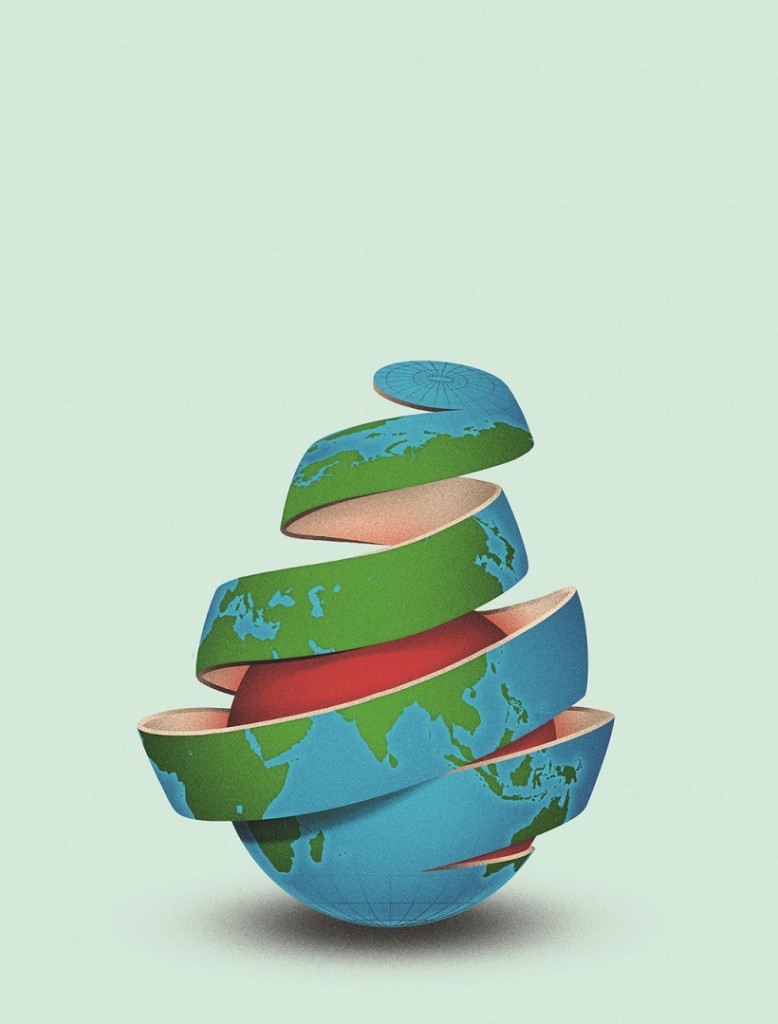Will Coronavirus bring an end to globalization?
Haroon Gulzar
It was 19th of December 2019 when a 55-year-old individual from Wuhan city in China tested positive for a new type of flu. Initially, people considered and dealt with it like normal flu but the havoc that it would play with everyone’s life in the year 2020 was beyond everyone’s imagination. The Coronavirus disease, or Covid-19, branded the year 2020 as the year of pandemic. It has just turned the world upside down. Within days the virus had spread from its point of origin across the globe. Governments all over the world announced lockdowns. Major cities, businesses, schools, gyms and restaurants were shut down in a matter of days. International flights were banned so as to control the spread of polyhedron of Covid-19. The unimaginable had happened; the world had come to a screeching halt. So much so that people started discussing the reversal of global warming since the injection of pollutants in the environment had fallen drastically. In short, the world was left clueless as to what could be done to stop the damage.
First and foremost, let’s understand here what is globalization; Globalization is the mutual dependence of the world’s economies, cultures, and populations, brought about by cross-border trade in goods, technology, flows of investment, people, and information. It is not a recent phenomenon it is as old as the human civilization, yes the speed, type and the extent of globalization has evolved with human evolution.
In this difficult time, some analysts wrongly assumed that coronavirus will bring an end to globalization. Their line of reasoning was based on two logics. First, this pandemic will increase conflict between the U.S. and China that will accelerate Deglobalization. Second, the world of trade will change forever as supply chains will become longer, and more complex. However, time proved that both were just a myth.
Why do I say these assumptions were wrong? Why an end to globalization is a myth? In today’s world national interests are so diverse that no country can exist in a bubble, they have to interact with the world in order to survive. The world is socially, religiously, politically, and economically interdependent. This argument can be justified in the light of historical and current pieces of evidence. To begin with, globalization survived despite 1720 — Plague; 1820 — Cholera outbreak; 1920 — Spanish flu. Globalization also pushed forward despite three world wars (WW1, WW2, and the Cold War). Even the 9/11 attack did not end globalization; it just added layers of screening. For the later, along with many countries, Turkey opened its borders, Pakistan opened international flights, and England ended the lockdown just after five months of outbreak. Globalization proves to be an unending process. 
The world has become a global village and countries cannot survive without interacting with each other. Countries need goods and services from one another. For example, trade between China and Russia is projected to raise to $200 Billion in 2020. Similarly, China and the USA have a mutual trade volume of $654 Billion. So, the interdependence of countries will not bring an end to globalization.
Personal interconnections between different parts of the world formed over the past several decades of globalization cannot be easily broken. People have friends and family living abroad. In some cases, the whole family migrates in a foreign country while leaving all relatives back to their home country. They keep visiting their relatives on special occasions (on marriage ceremonies, death occasions, and such other important events). In other cases, many people have business concerns in different parts of the world while they are settled in different parts of the world. Can you imagine breaking of this bond? NEVER.
The advances in communication methods especially internet are faster and more efficient than ever, they remain unaffected by the coronavirus outbreak. People are using the Internet more than ever during the coronavirus pandemic. Similarly, the coronavirus pandemic is driving huge growth in remote freelance work. People are earning online. Offices are only physically controlled, but in actual everybody is doing work from home. Major businesses and educational institutes of the world are being controlled through the internet. Students are studying and giving exams online.
Global Religious Interdependency will also not bring the end to globalization. Why? The answer lies in these case examples. First, consider for example, Christianity. Christianity is the world’s largest religion having 2.4 billion followers (approximately 29 percent of the total population). The Holy places of Christians are located in different countries. So, stopping them to visit their holy places is not an option. Second, consider the example of Islam. Islam is the world’s second-largest religion having 1.9 billion followers (approximately 24 percent of the total population). Macca and Madinah in Saudi Arabia are two places that all Muslims wish to visit around the globe. They make the yearly pilgrimage and for that they have to travel. Jews from across the world travel to Israel for their religious duties. Sikhs from across the world travel to the sub-continent (this has been made easy for them via the new Kartarpur corridor), Hindus travel to India for their religious obligations. All of this is part of globalization. Global religious interdependency has left no option to end globalization.
Lastly, the solidarity shown by countries in these difficult times to fight against coronavirus is proof that major pandemic cannot divide countries but only unite them. For example, right after the outbreak of COVID-19, China donated coronavirus testing kits to Cambodia, Sent planeloads of ventilators, masks, and medics to Italy and France, pledged to help the Philippines, Spain, and other countries, and deployed medics to Iran and Iraq. Similarly, the World Bank group moves quickly to help countries respond to coronavirus. The group expects to deploy up to $160 billion over the next 15 months to help countries. WHO (World Health Organization) is willing to help countries on an equal footing. More than that, America Provided 100 Ventilators to Pakistan to support COVID-19 Response. Pakistan has started making their first in-house ventilators using technology they imported. All of this is proof for globalization and proof that globalization is required more than ever now.
Evidence provided above puts an end to the assumption of coronavirus bringing about an end to globalization. With that said, what is the way forward? How can countries work together to stop the pandemic? We must unite nationally and globally to fight this pandemic and everyone needs to take individual responsibility. All lives matter regardless of geographic, social or religious boundaries. Global leaders must unite to ensure everyone everywhere has access to the vaccine when it comes about, tests and treatments for COVID-19.
There is a dire need to change our attitude and modify our priorities at all levels; at the government level, the organizational or corporate level, and the individual level. At the government level, the state must ensure smart lockdowns, complete lockdowns in the most affected areas, implement SOPs in real meanings, and educated and encourage citizens to fight against coronavirus instead of worrying about it.
Effective use of social media to share correct information has become a necessity. Instead of creating panic through misinformation, highly authorized, and transparent data must be shared. For example, India has launched WhatsApp chatbot to share correct information, and to avoid uncalled for panic. Media must be used in a positive way around the globe.
Global super powers including United States of America, and China should pursue in both bilateral and multilateral settings and all must cooperate on vaccine creation, and assist the poorest nations in battling the virus just like they did in the year 2014 to address the Ebola Crisis in Africa. They should prioritize the development of strategic reserves over economic nationalism.
In conclusion, one can safely say that form and shape of globalization will be altered but end of globalization is not a possibility.
 Jahangir's World Times First Comprehensive Magazine for students/teachers of competitive exams and general readers as well.
Jahangir's World Times First Comprehensive Magazine for students/teachers of competitive exams and general readers as well.



